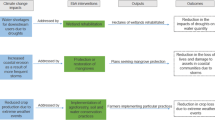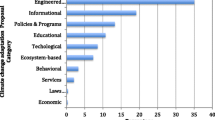Abstract
While ecosystems-based adaptation (EbA) has been received with great interest, the requirements for EbA implementation and its precise benefits under future climate change are unclear. Furthermore, EbA’s overlap with environmental, and development policy agendas leads to ambiguity regarding what actions fall under the rubric of EbA. We analyze the projects identified by the UNFCCC as examples of EbA to understand how EbA is conceptualized and promoted by the international community. Addressing climate change is the primary objective of 58% of the EbA projects; the other 42% of projects provide adaptation benefits yet are not primarily driven by climate change. A project’s adaptation targeting is tied to its information needs. Projects whose primary objective is to address climate change are more likely to use detailed climate projections than projects whose primary objective is to address natural hazards, development or ecosystems degradation. A majority of projects do not address uncertainty in future climate change or in adaptation benefits, nor do they track adaptation outcomes. This prevalent lack of monitoring highlights the possibility of a gap between expected and realized adaptation outcomes. It also represents a lost opportunity for improving knowledge of the thresholds of effectiveness of EbA and of factors influencing EbA efficacy.



Similar content being viewed by others
Notes
A project was coded as having reported on a progress or effectiveness metric if that type of metric was available for at least 25% of the activities within a project.
References
Adger N, Agrawala S, Mirza MMQ et al (2007) Assessment of adaptation practices, options, constraints, and capacity. In: Parry ML, Canziani, OF, Palutikof, JP et al (eds) Climate change 2007: impacts adaptation and vulnerability. Contribution of working group II to the fourth assessment report of the intergovernmental panal on climate chanage. Cambridge University Press, Cambridge, pp 717–743
Ayers J, Dodman D (2010) Climate change adaptation and development I: the state of the debate. Prog Dev Stud 10:161–168
Barron JS, Joyce LA, Griffith B et al (2008) Preliminary review of adaptation options climate-sensitive ecosystems and resources. In: Julius SH, West JM (eds) US Climate Change Science Program and the Subcommittee on Global Change Research, Washington, DC
Berrang-Ford L, Ford JD, Paterson J (2010) Are we adapting to climate change? Glob Environ Chang 21:25–33
Biesbroek GR, Klostermann JM, Termeer CAM et al (2013) On the nature of barriers to climate change adaptation. Reg Environ Chang 13:1119–1129
Brink E, Aalders T, Ádám D et al (2016) Cascades of green: a review of ecosystem-based adaptation in urban areas. Glob Environ Chang 36:111–123
Carlson K, McCormick S (2015) American adaptation: social factors affecting new developments to address climate change. Glob Environ Chang 35:360–367
Chong J (2014) Ecosystem-based approaches to climate change adaptation: progress and challenges. Int Environ Agreements 14:391–405
Clar C, Prutsch A, Steurer R (2013) Barriers and guidelines for public policies on climate change adaptation: a missed opportunity of scientific knowledge-brokerage. Nat Res Forum 37:1–18
Council NR (2012) A national strategy for advancing climate modeling. The National Academy of Sciences, Argonne
Doswald N (2011) Ecosystem-based approaches to adaptation and mitigation - good practice examples lessons learned in Europe. Bundesamt für Naturschutz Federal Agency for Nature Conservation
Doswald N, Munroe R, Roe D et al (2014) Effectiveness of ecosystem-based approaches for adaptation: review of the evidence-base. Climate and Development 6:185–201
Dupuis J, Biesbroek R (2013) Comparing apples and oranges: the dependent variable problem in comparing and evaluating climate change adaptation policies. Glob Environ Chang 23:1476–1487
Ford JD, Berrang-Ford L, Lesnikowski A et al (2013) How to track adaptation to climate change: a typology of approaches for national-level application. Ecology and Society 18: article 40
IPCC (2014) Summary for policymakers. In: Field CB, Barros VR, Dokken DJ, et al (eds) Climate change 2014: impacts, adaptation, and vulnerability. Part a: global and sectoral aspects. Contribution of working group II to the fifth assessment report of the intergovernmental panel on climate change. Cambridge University Press, Cambridge, United Kingdom, and New York, NY, USA, pp 1–32
Jones HP, Hole DG, Zavaleta ES (2012) Harnessing nature to help people adapt to climate change. Nat Clim Chang 2:504–509
Kettle NP, Dow K (2016) The role of perceived risk, uncertainty, and trust on coastal climate change adaptation planning. Environ Behav 48:579–606
Khan MR, Roberts JT (2013) Adaptation and international climate policy. Wiley Interdiscip Rev Clim Chang 4:171–189
Klein RJT, Midgley GF, Preston BL et al (2014) Adaptation opportunities, constraints, and limits. In: Field CB, Barros VR, Dokken DJ, et al (eds) Climate change 2014: impacts, adaptation, and vulnerability. Part a: global and sectoral aspects. Contribution of working group II to the fifth assessment report of the intergovernmental panel of climate change. Cambridge University Press, Cambridge, United Kingdom and New York, NY, USA, pp 899–943
Koch EW, Barbier EB, Silliman BR et al (2009) Non-linearity in ecosystem services: temporal and spatial variability in coastal protection. Front Ecol Environ 7:29–37
Mercer J, Kelman I, Alfthan B, et al (2012) Ecosystem-based adaptation to climate change in Caribbean small island developing states: integrating local and external knowledge. Sustainability 4:1908–1932
Mimura N, Pulwarty RS, Duc DM et al (2014) Adaptation planning and implementation. In: Field CB, Barros VR, Dokken DJ, et al (eds) Climate change 2014: impacts, adaptation, and vulnerability. Part a: global and sectoral aspects. Contribution of working group II to the fifth assessment report of the intergovernmental panel of climate change. Cambridge University Press, Cambridge, United Kingdom and New York, NY, USA, pp 869–898
Munang R, Andrews J, Alverson K et al (2013) Harnessing ecosystem-based adaptation to address the social dimensions of climate change. Environ Scie Policy Sus Dev 56:18–24
Munroe R, Roe D, Doswald N et al (2012) Review of the evidence base for ecosystem-based approaches for adaptation to climate change. Environment Evidence 1:13
Naumann S, Davis M, Munang R et al (2013) The social dimension of eco-system based adaptation. UNEP Policy Series: Ecosystem Management
Noble IR, Huq S, Anokhin YA, et al (2014) Adaptation needs and options. In: Field CB, Barros VR, Dokken DJ, et al (eds) Climate change 2014: impacts, adaptation, and vulnerability. Part a: global and sectoral aspects. Contribution of working group II to the fifth assessment report of the intergovernmental panel of climate change. Cambridge University Press, Cambridge, United Kingdom and New York, NY, USA, pp 833–868
Ojea E (2015) Challenges for mainstreaming ecosystem-based adaptation into the international climate agenda. Curr Opin Environ Sustain 14:41–48
Perez AA, Fernandez BH, Gatti RC (2010) Building resilience to climate change: ecosystems-based adaptation and lessons from the field. IUCN, Gland
Petersen C, Holness S (2010) World Resources report case study. South Africa : ecosystem-based planning for climate change. Washington DC
Preston BL, Mustelin J, Maloney MC (2015) Climate adaptation heuristics and the science/policy divide. Mitig Adapt Strateg Glob Chang 20:467–497
ProAct Network (2008) The role of environmental management in disaster risk reduction and climate change adaptation, Annex I, Case studies
Sierra-Correa PC, Cantera Kintz JR (2015) Ecosystem-based adaptation for improving coastal planning for sea-level rise: a systematic review for mangrove coasts. Mar Policy 51:385–393
Smit B, Wandel J (2006) Adaptation, adaptive capacity and vulnerability. Glob Environ Chang 16:282–292
Stadelmann M, Michaelowa A, Butzengeiger-Geyer S, et al (2014) Universal metrics to compare the effectiveness of climate change adaptation projects. In: Leal Filho W (ed) Handbook of climate change adaptation. Springer, Berlin Heidelberg, pp 1–15
Stavins R, Zou J, Brewer T, et al (2014) International cooperation: agreements and instruments. In: Edenhofer O, Pichs-Madruga R, Sokona Y, et al (eds) Climate change 2014: mitigation of climate change. Contribution of working group III to the fifth assessment report of the intergovernmental panel on climate change. Cambridge University Press, Cambridge, United Kingdom. New York, New York
Stemler S (2001) An overview of content analysis. Practical Ass Res Evaluation 7:137–146
UNEP (2012) Making the case for ecosystems-based adaptation: building resilience to climate change. UNEP, Nairobi, Kenya
UNEP (2015) Implementation of resolutions adopted by the United Nations Environment Assembly at its first session. Addendum Resolution 1/8: ecosystem-based adaptation. Report of the Executive Director
UNFCCC (2011) Ecosystem-based approaches to adaptation: compilation of information. FCCC/SBSTA/2011/INF.8 Thirty-fifth Session, Item 3 of the provisional agenda
UNFCCC (2012) Nairobi work programme on impacts, vulnerability and adaptation to climate change. http://unfccc.int/adaptation/nairobi_work_programme/knowledge_resources_and_publications/items/6227.php. Accessed May 28, 2016
UNFCCC (2015) Database on ecosystem-based approaches to adaptation. http://unfccc.int/adaptation/nairobi_work_programme/knowledge_resources_and_publications/items/6227.php. Accessed September 20, 2015
UNFCCC (2016) Progress made in implementing activities under the Nairobi work programme on impacts, vulnerability and adaptation to climate change. in Subsidiary Body for Scientific and Technological Advice (ed.) Forty-Fifth Session, Marrakech
United Nations Development Programme (2006) Adaptation to climate change—responding to coastline change in its human dimensions in West Africa through integrated coastal area management (ACCC). pp. 128–128
Wamsler C (2015) Mainstreaming ecosystem-based adaptation: transformation toward sustainability in urban governance and planning. Ecology and Society 20
Wamsler C, Pauleit S (2016) Making headway in climate policy mainstreaming and ecosystem-based adaptation: two pioneering countries, different pathways, one goal. Climatic Change:1–17
World Bank (2009) Convenient solutions for an inconvenient truth: ecosystem-based approaches to climate change
Acknowledgements
We thank the Energy and Resources Group at the University of California Berkeley, Margaret Torn, Holly Jones, Mark Wamsley, and two anonymous reviewers for their suggestions and input on this research. Sole responsibility for the content of this publication lies with the authors.
Author information
Authors and Affiliations
Corresponding author
Electronic supplementary material
Below is the link to the electronic supplementary material.
ESM 1
(PDF 604 kb)
Rights and permissions
About this article
Cite this article
Milman, A., Jagannathan, K. Conceptualization and implementation of ecosystems-based adaptation. Climatic Change 142, 113–127 (2017). https://doi.org/10.1007/s10584-017-1933-0
Received:
Accepted:
Published:
Issue Date:
DOI: https://doi.org/10.1007/s10584-017-1933-0




